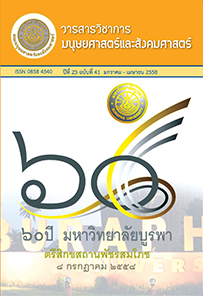Strategic Risk Management Implementation and Organizational Environment of Road Safety in Thailand
Main Article Content
Abstract
Accidents on the road are one of the highest causes of death and injury worldwide. 1.24 million people were killed on the world’s roads and approximately 35 million were injured by road traffic crashes in 2010. UNGA announced a Decade of Action for Road Safety. The strategies of the Decade (2011-2020) aim to reduce the increasing trend in road traffic fatalities and injuries in the member countries including Thailand.
The objectives of this study are to study the relationship between organizational environment and strategic risk management implementation of road safety in the Royal Thai Police and Department of Disaster Prevention and Mitigation, Ministry of Interior, and to search for an operational approach for the implementation of strategic risk management.
This study revealed that informal groups were not recognized on organization charts and not officially created to serve an organizational purpose. Incorporation of a road safety office could be set up. Specialists were employed in the organization and taken a roll in the formal group to help them be more effective in managing risk. The budget process of overfunding or underfunding always seemed to be significant problems of risk management. The Thai government had declared a Decade of Road Safety to be the national policy of risk management and budgets should be allocated directly for the deployment of resources to achieve specific targets.
As a result, organizations that are accountable should focus on budgeting. Further researches may investigate the financial measures for evaluating projects of road safety programs that could generate resources for the monitoring of these programs.
Downloads
Article Details
บทความทุกบทความเป็นลิขสิทธิ์ของวารสารวิชาการมนุษยศาสตร์และสังคมศาสตร์ มหาวิทยาลัยบูรพาเท่านั้น


